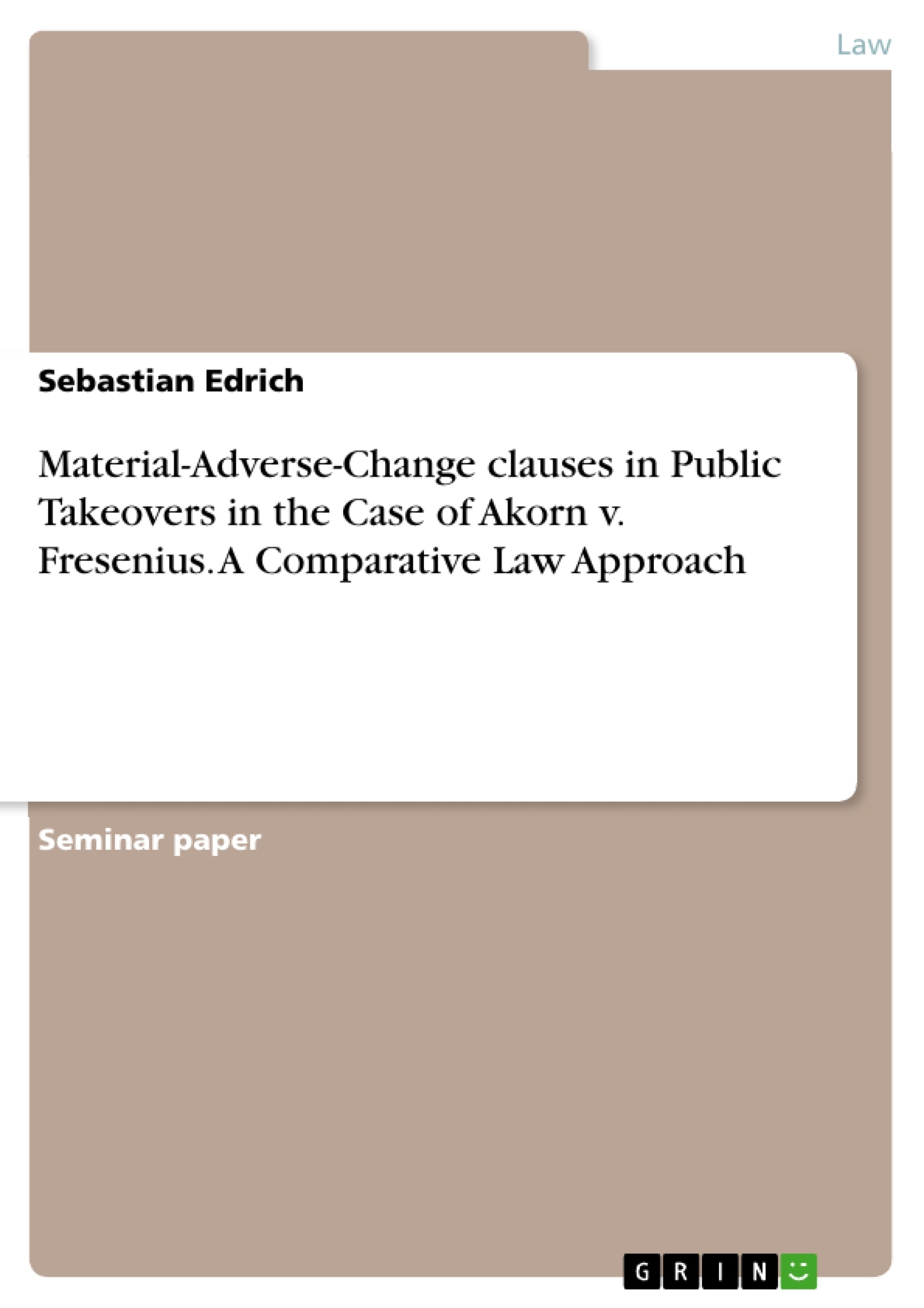Excerpt
Table of Contents
Bibliography
Table of U.S. jurisdiction
List of Abbreviations
A. Introduction
B. Relevance of the MAC clause in Germany and the U.S
I. The inherent risk in business transactions
II. Current legal status quo
1. § 313 BGB
a) Requirements
b) Arising issues
c) Application to takeover bids
2. Frustration Doctrine
3. Conclusion
C. Akorn v. Fresenius and the Material Adverse Change
I. Case Study
1. Background
a) Facts (pre-Signing)
b) The operation of the MAC clause in the agreement
aa) MAC condition
bb) Definition of MAC
cc) Inferences
c) Facts (post-Signing)
2. Legal analysis of the court regarding the MAC clause
a) Materiality
aa) Digression: Reasons for an undefined standard
(1) Definition vagueness
(2) Impracticability of quantitative benchmarks
(3) Lack of substantive SEC rules
bb) Existing case law regarding the materiality standard
(1) Long-term perspective of a reasonable buyer (In re IBP)
(2) Year-over-year comparison (Hexion v. Huntsman)
cc) Conclusion
(1) Financial metrics
(2) Durational significance
(3) Standalone-evaluation standard
b) Carve Outs
II. Creation of a framework for MAC clauses?
1. Structural standard for MAC clauses
a) Strict expressio unius interpretation in previous cases
b) Parol Evidence Rule valuations
aa) Rule
bb) No restrictive interpretation by default
cc) Drafting consequences
2. Two step materiality standard for determining a MAC
a) Magnitude element
aa) Sudden drop
bb) Decline in earnings guideline
b) Flexible durational element
aa) Long-term
bb) Short-term exception
D. MAC clauses in the corset of the German Securities Acquisition and Takeover Act
I. Conflict of interests
II. Legitimacy of MAC clauses in takeover offers
1. Voluntary takeover offers
a) § 18 WpÜG
b) MAC clauses in the form of an objective condition
c) MAC clauses in the form of a right to revoke or rescind
aa) Wording of § 18 II WpÜG
bb) Teleological reduction of § 18 II WpÜG
cc) Purpose of § 18 WpÜG
2. Mandatory takeover offers
III. Content requirements for admissible MAC clauses
1. Statutory requirements
a) Principle of Certainty (§ 18 I WpÜG)
aa) Wording of § 18 I WpÜG
bb) § 18 I WpÜG in the system of the WpÜG
b) Principle of Transparency (§ 3 II WpÜG)
2. Implementation in the takeover practice
a) Current takeover offers
aa) E.ON / Innogy
bb) Midea / KUKA
b) Practice requirements
aa) Specification of the MAC though financial thresholds
bb) Linkage to § 15 WpHG
cc) Determination of the MAC by an independent auditor
E. Overall conclusion
- Quote paper
- Sebastian Edrich (Author), 2019, Material-Adverse-Change clauses in Public Takeovers in the Case of Akorn v. Fresenius. A Comparative Law Approach, Munich, GRIN Verlag, https://www.grin.com/document/539474
Publish now - it's free






















Comments